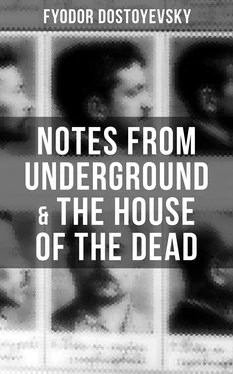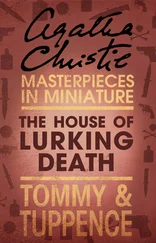I also remember a prisoner who was supposed to have been a well-to-do Siberian peasant. Six years before he had had news of his” wife’s remarrying, which had caused him great pain. One evening she came to the prison and asked for him in order to give him a present! They talked together for two minutes, wept together, and then separated never to meet again. I saw the expression on that man’s face when he reentered the barracks. There, indeed, one learns to endure all.
When darkness set in we had to be indoors and were shut up for the night. I always found it painful to leave the courtyard for the barrack-room. Think of a long, low, stifling room, dimly lit by tallow candles, and full of heavy, disgusting odours. I cannot now understand how I lived there for ten whole years. My camp bedstead was made of three boards. It was the only place in the room that belonged to me. More than thirty of us were herded together in one room. It was, indeed, no wonder that we were shut up early. At least four hours passed before everyone was asleep, and until then there was a tumult of laughter and oaths; rattling of chains and a poisonous atmosphere of thick smoke; a confusion of shaved heads, branded foreheads, and clothes that were no more than filthy rags.
Yes, man is a pliable animal-he must be so defined: a being who grows accustomed to everything! That would be, perhaps, the best definition that could be given of him. There were altogether two hundred and fifty of us in the same; prison, and that number remained almost invariably the same. Whenever some of us had done our time, other criminals arrived; and there were a few deaths. The population of that prison included all sorts of people: I believe that each region of Russia had furnished its representatives. There were foreigners, too, and even mountaineers from the Caucasus.
All these people were divided into different classes according to the gravity of their crimes; and consequently the length of their sentences was reflected in the class to which they were i assigned. The majority had been condemned to hard labour of the civil class-’ strongly condemned,’ as the prisoners used to say. They were criminals deprived of all civil rights, men rejected by society, vomited forth, whose brows were marked by the iron to testify for ever to their disgrace. They were incarcerated for periods of from eight to ten years, and at the expiration of their punishment they were sent as colonists to various parts of Siberia.
As to the criminals of the military section, they were not deprived of their civil rights-as is generally the case in Russian disciplinary companies-and were punished for a relatively short period. As soon as they had undergone their punishment they had to return to their units, whence they were posted to battalions of the Siberian Line. 1
1 Goriantchikoff himself became a soldier in Siberia when he had finished his term of imprisonment.
Many of them came back to us later for serious crimes, this time not for a short spell, but for twenty years at least. They then formed part of the in perpetuo section. Nevertheless, the ‘perpetuals’ were not deprived of their civil rights. There was another and sufficiently numerous class, composed of the worst malefactors. These were nearly all veterans in crime, and were called the Special section. It included convicts from all the Russias. They looked upon one another with reason as imprisoned for ever, for the term of their confinement was indefinite: the law required them to receive double and treble tasks, and they remained in prison until work of the most painful character had to be undertaken in Siberia.
‘You are only here for a fixed time,’ they used to tell the other convicts; ‘we, on the contrary, are here for life.’ I have heard that this section has since been abolished.
At the same time, civil convicts are still kept apart, in order that the military convicts may be organized by themselves into a homogeneous ‘disciplinary company.’ The administration, too, had of course been changed; consequently what I describe are the customs and practices of another time-things which have since been abolished. Yes, it was a long time ago; it all seems to me like a dream. I remember entering the prison one December evening as darkness fell. The convicts were returning from work, and the roll was about to be called. An under-officer with large moustaches opened to me the gate of this strange house where I was to remain so many years, to experience so many emotions, of which I could not form even an approximate idea if I had not gone through them. Thus, for example, could I ever have imagined the poignant and terrible suffering of never being alone even for one minute during ten years? Working under escort in the barracks together with two hundred ‘companions’: never alone, never!
However, I was obliged to get accustomed to it. Among them there were men guilty of wilful murder and manslaughter, burglars, master pickpockets, cutpurses, petty thieves, and shoplifters.
It would have been difficult, however, to say why and how certain convicts found themselves in prison. Each of them had his history, confused and heavy, painful as the morning after a debauch.
The convicts, as a rule, spoke very little of their past life, which they did not like to think of. They endeavoured, even, to dismiss it from their memory.
Among my companions in chains I have known murderers who were so gay and so carefree that one might have made a bet that their consciences never for a moment reproached them. But there were also men of sombre countenance, who remained almost always silent. It was very rarely anyone told his history: that sort of thing was not done. Indeed, it was not tolerated. Every now and again, however, by way of a change, one prisoner would tell another his life story, and the other would listen coldly to the narrative. No one, to tell the truth, could have said anything to astonish his neighbour. ‘We’re not fools,’ they would sometimes say with singular pride.
I remember one day an intoxicated ruffian-it was sometimes possible for the convicts to obtain drink-relating how he had killed and cut up a child of five. He had first tempted the child with a toy, and then taking it to a loft had cut it up to pieces. The entire barrack, which generally speaking laughed at his jokes, uttered one unanimous cry. The blackguard was obliged to shut up. But if the convicts interrupted him, it was not by any means because his recital had aroused their indignation, but because it was forbidden to speak of such things.
I must here observe that the convicts as a community possessed a certain degree of education. Half of them, if not more, knew how to read and write. Where in Russia, in no matter what district, could two hundred and fifty men be found able to read and write? Since then I have heard people say, and conclude on the strength of the literate criminal, that education demoralizes the people. This is a mistake. Education has nothing whatever to do with moral deterioration; and if one must admit that it develops a resolute spirit among the people, that is far from being a defect.
Each section was differently dressed. The uniform of one consisted of a cloth vest, half brown and half grey, and trousers with one leg brown, the other grey. One day while we were at work, a little girl who sold scones of white bread came towards the convicts. She looked at them for a time and then burst into a laugh. ‘Oh, how ugly they are!’ she cried; ‘they have not even enough grey cloth or brown cloth to make their clothes.’ Every convict wore a vest made of grey cloth, except the sleeves, which were brown. Their heads, too, were shaved in different styles. The crown was bared sometimes longitudinally, sometimes latitudinally, from the nape of the neck to the forehead, or from one ear to another.
Читать дальше












